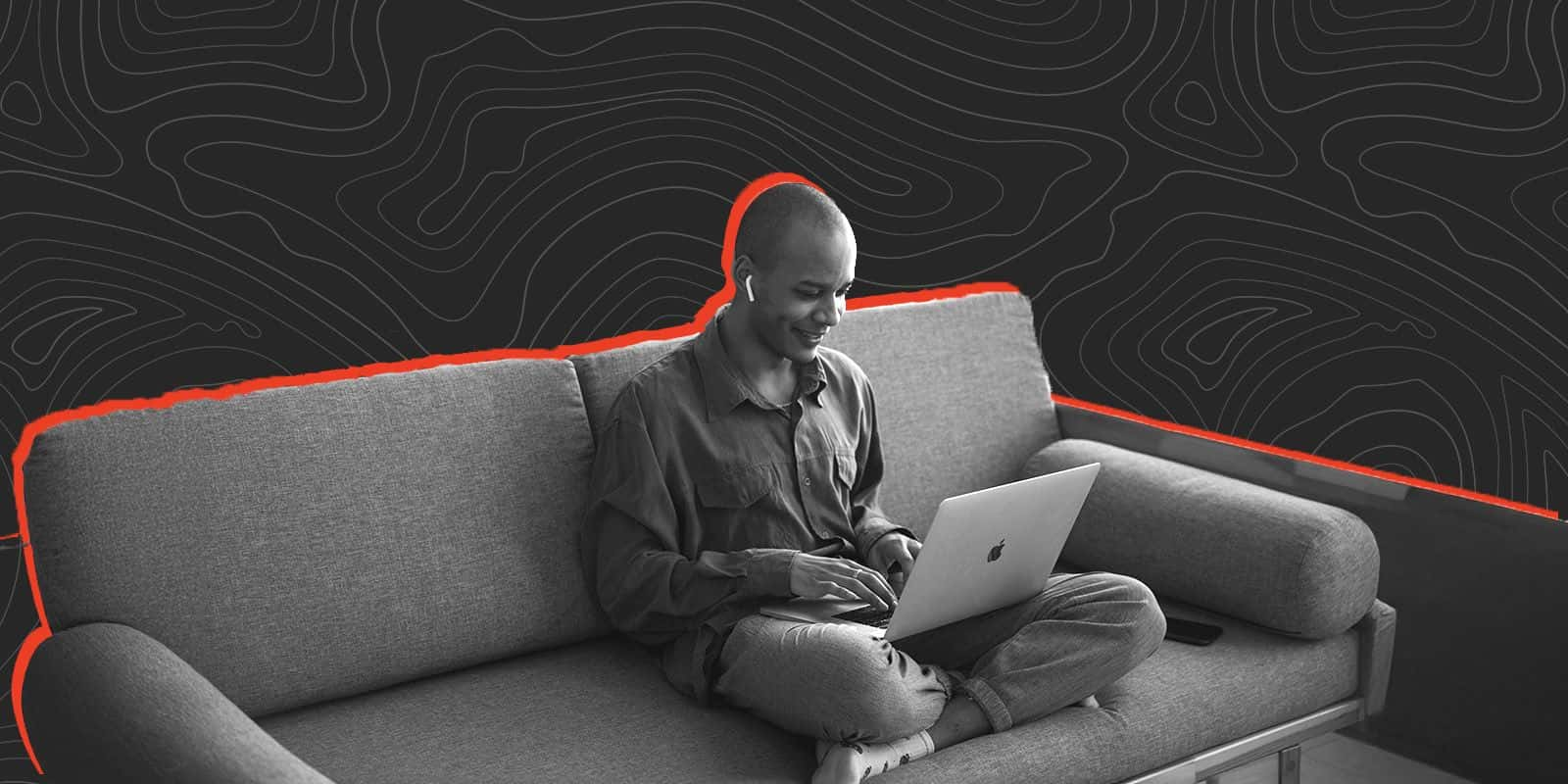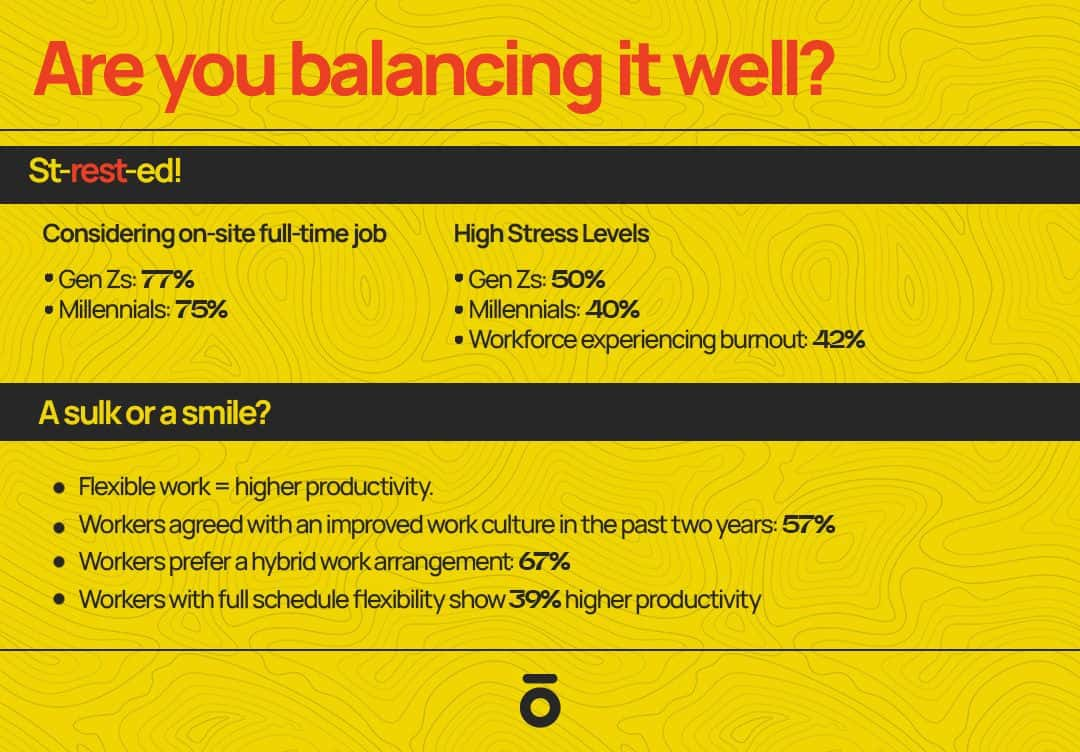Work-Life Balance: Tips for a Happier, Healthier Lifestyle

Introduction
As we stopped for the hundredth time, I checked my phone in frustration. It was around 9 pm. Traffic today was horrible. In my eternal effort to care for the environment and also my overworked/abused purse strings, I opted to take a shared cab.
Translation - I was cooped up with over twenty people making numerous stops, all while braving the Bengaluru traffic.
All of a sudden, the hair on the back of my neck stood up.
“Ting ting tan tan ting ting”
It was a sound that I recognised well.
One of the passengers had fished out their laptop and was attending a Teams call as I looked on in despair.
The traffic noise was interrupted by sharp words like "deadline," "dashboard," and "circle back." I desperately looked at the guy sitting beside me. I found him in a deeply meditative state, typing out an email on his phone.
As the shuttle groaned on braving through the impenetrable vehicles, I wondered if we ever really "switch off".
Work-life balance: A realistic idea or an elusive concept?
I heard this phrase while looking at company reviews on Glassdoor just before starting my first job.
"Great work-life balance", read one review.
It was only after consistently leaving the office after 8 and obsessing over code fixes that went wrong even after going home that I understood that the review was sorely wrong.
A UKG survey found that 78% of employees in India experience workplace burnout caused by work-related stress. It is so severe that people actually lose their lives to the rat race. A report by the World Health Organisation and International Labour Organisation in 2021 found that there were over 7.45 lakh deaths due to stroke and ischemic heart diseases in 2016, which were directly linked to long working hours.
The most recent incident that caused a huge uproar occurred at one of the top four audit firms in the world, where a young girl lost her life due to unmanageable stress at her workplace.
In this eternal rat race where everyone is running to secure promotions to pay off their loans and EMIs and attempting to climb the social ladder, the epidemic that's taking over is OVERWORKING!

Work-life balance for dummies. What is it?
It is what's said on the tin: balance between our work-life and our personal lives.
It is strange that we call it work-life, like we have separated work from our lives, as if there is no life at work! However, isn't work just a part of our lives? After thousands of years of evolution, we humans have come to a place where we literally have to ask for permission from our managers to go for coffee, even five hours after leaving the office, because the CLIENT might need us anytime!
The fact that job listings have to mention "work-life balance" is the biggest irony. But here we are. The idea is to be able to separate the two aspects of life: work and post-work. How do you identify that you don't have a work-life balance?
Are you unsure if you have the ideal work-life balance? There could be tell-tale signs that you are a victim of the grind and do not have the necessary balance. This could eventually lead to workplace burnout.
1. Weekend meetings:
Your client is sitting in California and wants to speak to you at 6 pm. But 6 pm PST. On a Friday. In a different part of the world. So you get up to attend the call at 7:30 am on Saturday morning. The call drags on. You did not get enough sleep. You are too tired to make plans. Your day is ruined.
If your situation sounds like this, my friends, then it's time to draw clear boundaries and make sure that you are switching off from work.
2. "Just monitoring" during free time:
It feels almost innocent. All you need to do is monitor some stats. Any time after work should be fine—or so you thought. It has now begun to feel like a task, and even though you are officially not on the clock, it sure does feel like it!
3. Taking office calls at home:
You may think that you could leave early and then take any calls from home. Did a request come in to reschedule the call for a later time? Sure. You will be home. You can take it with ease. Before you know it, it is now a daily occurrence, and you have headphones on even during your daughter's wedding.
4. Checking emails during vacation:
After much hesitation, you finally decided to apply for that vacation leave. You can finally get away! But there are reviews pending and client feedback to check. Surely, checking an email during your time away is not that bad?
Well, it is. It is easily possible that while you are checking your email, you come across an angry client email or an escalation. And now you are anxious in the middle of a beach. By catching up on work, you are denying your mind that much-needed break that it needs to get away from it all.
How do we get it back?
Congratulations. You've read this far and you might be curious to know how to go about it all. Managers, look away!
You're probably overworked and feel the onset of burnout. Worry not! I'm here to help!
1. Acknowledge that there is a problem:
The first step is to acknowledge that work has progressed beyond the necessary 9-5 and crept into a time that is inarguably just yours. Once you have acknowledged this encroachment, you can be more mindful of how you spend your time outside of work.
2. Time management:
A company owns your most important asset - that is your time. But it should be noted that it does not have to own all of your time. And this is where you learn to manage your time - both at and outside of work.
3. Prioritise efficiency:
Let's say you have to put in nine hours at work. You have three tasks that you need to complete by the end of the day. You estimate it to be all done in four hours. So, you take an hour-long lunch break. You look at some YouTube videos. You catch up with your colleagues. Maybe even step out for some coffee. And before you know it, it's already 6 pm.
So you decide to stay back to finish off your work. Since you head out late, the traffic is worse. You are now late to get home. It's already 10 pm. You check your calendar and see an 8 am call scheduled. You feel like your whole day just slipped past without having a moment to yourself.
By prioritising efficiency, we can try to utilise the exact work hours so it does not spill over into our own time.
4. Switch off:
SWITCH OFF! Like, actually! Many of us are guilty of checking our emails even after logging out of work. Maybe even sending a response to a client inquiry. "It's just a quick reply", we tell ourselves. "Won't take a minute."
While sending the reply might just take a couple of minutes but what it does is it forces our brain to think about work. So, even if you are sitting in a cafe with your friends or catching a movie, you are now inadvertently thinking about work.
5. Work emails on the phone/WhatsApp groups for work:
We might think that having work emails, a messaging app on our phones, or being part of a WhatsApp group for work (yes, crazy!) might save us time and help us stay on top of things. But it creates an addictive habit of always wanting to check our phones to see if we missed anything, consciously or even subconsciously.
6. Guilt about taking leave that you are owed:
Many people internalise the idea that needing time off is a sign of weakness, something to be looked down upon. A voice tells you that you are not a high performer if you are away from work for almost a month.
But is this voice right?
No. The reality is that every high-functioning person, be it an athlete, a chef, an engineer, or even a doctor, requires a healthy amount of time off. We need this time to recharge, refresh, have a mental reset, and take care of our health.
7. Unlearn hustle mentality:
We are sometimes driven to inculcate the idea of hustle in the workplace to get ahead in our careers. We are all a little too acquainted with the idea of "Work hard. Play hard." This idea promotes working hard by any means necessary, which impacts your mental and physical health.
Above all, I think what we are really seeking from hustling is validation—to be validated for our work, resilience, proactiveness, and productivity—words we all know a little too well. Once we can move past this idea of pushing ourselves to our limits, we can truly treat work as it is—simply a part of our lives.

Importance of Mental Health and Wellbeing
Ever since the Covid-19 pandemic, we have been seeing a rise in the idea of prioritising mental wellbeing over the crushing hustle culture. But in its entirety, work-life balance is not an innovative concept. Certain countries have always maintained a balanced lifestyle in which work does not overpower.
For them, getting ahead in their careers takes a backseat and priority is given to their family, recreation, travel, and leisure: in short, wellbeing.
Let's take a look at the top countries for work-life balance, according to the Organisation for Economic Co-operation and Development (OECD):
Did you see the pattern? The fact that many of the countries with the best work-life balance also feature in the happiness index couldn't be just a coincidence, right?

Conclusion
If you still think work-life balance is just a conceptual noise spoiling hardworking employees from "giving their all" to the company, I can ramble on with the stats. The fact that countries that prioritise the mental health of their workforce also rank much higher in the per capita index is another argument that defies the 70-hour workweek theory.
In the end, all you need to remember is that no matter how good an employee is, you are replaceable. So don't even bother!






